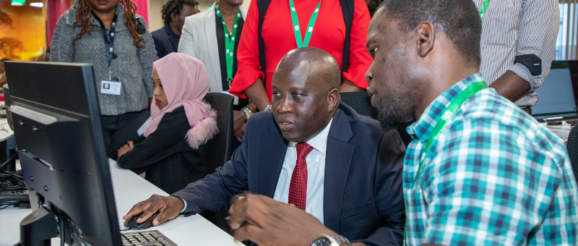Sama to Empower 2000 Youth and Women in AI Innovation

In an effort to bridge the digital divide, Sama has announced plans to hire and train 2000 youth and women to work on progressive AI projects outsourced to Sama by several Fortune 500 companies.
By retaining the workforce, Sama is actively working to position Kenya as an ideal investment destination for global AI value chain players. Sama’s efforts align with the Government’s Bottom-Up Economic Transformation Agenda (BeTA) on the Digital Economy Transformation.
The global Business Process Outsourcing (BPO) market is estimated to be valued at more than US$ 262 billion, with African countries continuing to emerge as the next BPO growth frontiers. The BPO sector is crucial in developing Artificial Intelligence (AI) systems that power the automotive, retail, agricultural, and food technology sectors.
Potential Profitability of Generative AI
According to recent research by the McKinsey Global Institute on generative AI and productivity, the AI value chain has the potential to generate value equivalent to $2.6 trillion to $4.4 trillion in global corporate profits annually.
Training in Computer Vision and Data Labelling
The 2,000 new Sama employees will be trained in computer vision and data labelling services, a field in high demand by AI developers and Machine Learning (ML) engineers globally. They will work on various projects, including labelling images and videos for machine learning algorithms as part of upstream AI data building.
Expanding Career Opportunities Across Kenya and Uganda
The initiative is part of Sama’s mission to expand opportunities for the underserved through the digital economy in Kenya and Uganda. To date, Sama has helped over 65,000+ people lift themselves out of poverty and build sustainable careers in the tech industry.
Speaking during the training commissioning, Sama, Vice President, Global Service Delivery Annepeace Alwala said, “The digital economy has emerged as a transformative force globally, noting that Kenya is well-positioned to contribute to creating a more inclusive AI ecosystem where everyone can make a meaningful impact.”
Supported by a conducive business environment, Sama intends to provide more work to the youth in Kenya through its global partnerships and anticipates that the number of people to hire can double in the coming months. This aligns with the Government’s agenda of creating digital jobs.
Harnessing the Potential of Marginalized Communities
The heart of Sama’s mission, she said, lies in harnessing the potential of marginalized communities and providing them with the tools and skills they need to thrive in the rapidly evolving digital landscape.
By focusing on underserved youth and women in Nairobi, Sama aims to bridge the digital divide and pave the way for sustainable economic growth.
“Through this initiative, we are not only creating employment opportunities for Kenyan youths but also ensuring that Kenya plays a significant role in shaping the future of AI development. Together, we’re fostering innovation, creating opportunities, and building a brighter future where Kenyan talent fuels the global AI revolution,” Ms. Alwala said.
600 New Employees Undergoing Training
The first 600 participants in Nairobi have already been hired and are currently undergoing training. The remaining 1,500 participants will be employed in the coming weeks. The new cohort will join Sama’s dynamic team of over 3,000 staff in Nairobi to work on computer vision AI projects for some leading global companies.
Principal Secretary of the State Department of ICT and the Digital Economy Eng. John Kpchumba Tanui, shared his thoughts on the companies plans to empower the youth to better prepare them for Kenya’s digital future; “The government is keen to turn Kenya into a digital economy by creating a conducive operating environment for the private sector. We congratulate Sama for their commitment to nurturing Kenyan youths on the AI Value chain. By employing 2,000 Kenyan youths, they are paving the way for a brighter future where talent meets technology, creating opportunities for our nation’s brightest minds.”
Tech Industry Expected to Foster Sustainable Development in Africa
According to a recently released UNCTAD report titled: The Economic Development in Africa Report 2023: The Potential of Africa to Capture Technology-intensive Global Supply Chains, as technology-intensive industries tend to offer higher wages and can have a positive job-multiplier effect, the potential of generating more employment in those sectors will have undeniable benefits for the workforce and foster sustainable development in Africa.
Facilitating a conducive environment for firms in those industries to establish or build new supplier relationships in African countries can help raise wages in Africa, which are set at a minimum of $220 per month, compared with an average of $668 in the Americas.
Comprehensive Training Program
The training program will cover various areas, including computer vision, machine learning, and data annotation. Participants will also receive soft skills training on communication, teamwork, and problem-solving topics.
Sama is a leader in the impact sourcing model. The company has a proven track record of delivering high-quality services to its clients while creating sustainable employment opportunities for talented yet underserved communities in Kenya, Uganda, and India. The company’s commitment to social responsibility and sustainability has earned it worldwide recognition from industry leaders and organizations.
15 Years Track Record
Sama, present in Kenya for 15 years, offers quality jobs and AI solutions for self-driving cars, VR gaming, fashion, and agriculture.
